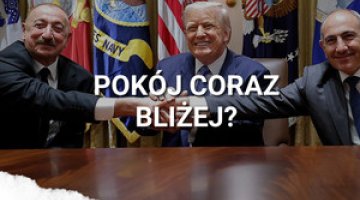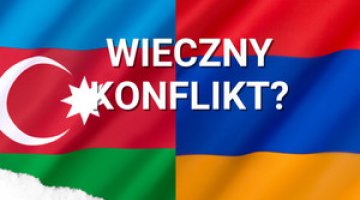A serious crisis in Armenian-Russian relations
In recent days Armenia has demonstratively distanced itself from Russia and its alliance with it, through a number of gestures and statements from Prime Minister Nikola Pashinyan, and signalled its desire for rapprochement with the West. In an interview with the Italian daily la Repubblica on 3 September, Pashinyan stated that relying on Moscow as its only partner in the security sphere had been a “strategic mistake” and that the country was only now trying to diversify its policy. On 5 September, the Prime Minister dismissed Armenia’s permanent representative to the Collective Security Treaty Organisation (CSTO) and failed to appoint a successor. This was accompanied by publicity about the Armenian-American Eagle Partner 2023 military exercises, which are scheduled to take place on 11–20 September in Armenia. Other anti-Russian steps taken in recent months include not allowing the head of the Russian Society for Friendship and Cooperation with Armenia into the country; a visit by Pashinyan’s wife to Kyiv along with a shipment of humanitarian aid, the first sent by Armenia to Ukraine since the outbreak of the war; and the referral to parliament for ratification of the Rome Statute of the International Criminal Court (ICC); adopting this measure would oblige Armenia to detain President Vladimir Putin and hand him over to the International Criminal Court in The Hague.
Commentary
- Armenian-Russian relations began to cool after the Second Karabakh War in autumn 2020. Although Moscow did save the Armenian side from ultimate defeat and the complete loss of control over Nagorno-Karabakh by bringing about a ceasefire, it was nevertheless subsequently unwilling or unable to respond to Azerbaijani attacks on Armenian positions – not only in Nagorno-Karabakh, but also within Armenia itself (e.g. in September 2022), although it was obliged to do so under bilateral alliance agreements and within the terms of the CSTO. Russia has also remained passive in the face of the ongoing blockade since December of the Lachin corridor linking Nagorno-Karabakh with Armenia (see ‘No special status, no Armenians? The prospects for Nagorno-Karabakh in a unitary Azerbaijan’). Disillusioned by this stance, Yerevan began to distance itself from both the CSTO (in January it cancelled all the Organisation’s exercises scheduled to take place on its territory this year) and from Moscow itself. A clear sign of Yerevan’s course correction was the interview Pashinyan gave to CNN in early June, in which he said that Armenia is not Moscow’s ally in the Russian-Ukrainian war. Yerevan’s moves are part of an evolution in the Armenian public’s attitude towards Russia: in poll after poll, a decreasing percentage of respondents see Russia as Armenia’s ally. According to a poll by the International Republican Institute from this spring, only 10% of respondents rated the two countries’ mutual relations as very good and 40% as rather good. At the same time, 15% of those questioned considered them very bad and 34% rather bad.
- The scale of the crisis is also demonstrated by Russia’s official reactions to the Armenian government’s statements and actions. This includes particularly harsh words from the Russian foreign ministry: for example, a spokeswoman for the ministry said that Moscow had asked Yerevan for clarification on its plans to ratify the Rome Statute. In turn, following the dismissal of Armenia’s representative to the CSTO and the announcement of military exercises with the US, one Russian deputy minister warned that “moving closer to NATO is unlikely to bring positive results for anyone in terms of ensuring security”. On 8 September, the Armenian ambassador was summoned to the Russian MFA, where he received a note of protest, and Moscow’s position on the “series of unfriendly steps” the Armenian government has taken was presented in an uncompromising manner. On social media, attacks on Armenia and personal assaults on Pashinyan by commentators close to the Kremlin have intensified.
- The background to the current crisis is the exacerbation of tensions around the Armenian-controlled part of Nagorno-Karabakh (over which Moscow is acting as the de facto protector through its peacekeeping forces). Since the beginning of September, Baku has been ostentatiously concentrating its armed forces around the enclave – and on its border with Armenia – while the ever-tighter blockade of the Lachin corridor is worsening the humanitarian situation in the para-state. These circumstances are accelerating the decomposition and erosion of its power structures: the leader of the ‘Nagorno-Karabakh Republic’, Araik Harutiunian, has resigned and his successor Samvel Shahramanian was elected on 9 September; and there are reports that the families of senior officials have fled to Armenia.
- In tactical terms, Pashinyan’s pro-Western gestures are aimed at drawing the attention of the EU, the US and Western capitals to the situation in and around Armenia, and at obtaining their ad hoc political assistance in the confrontation with Azerbaijan. The European Union Mission in Armenia (EUMA) civilian observer mission, which has been present on the ground since the beginning of this year, is influencing regional stability; its presence also increases the political cost of any military operations Azerbaijan may decide to launch on Armenian territory. Similarly, the involvement of the EU and the US in the process of normalising relations between Armenia and Azerbaijan has played a stabilising and strengthening role. However, the prospect of more active Western involvement in Armenia and its neighbourhood remains questionable in view of limited resources and the focus on the Russian-Ukrainian war. It seems all the more premature to speculate on whether the West can viably replace Russia as Armenia’s strategic partner.
- Given the distrust with which Moscow has treated Pashinyan since he came to power in 2018, and the seriousness of his anti-Russian statements, a return to good or even ‘proper’ bilateral relations seems impossible without a change of power – in either Yerevan and/or Moscow. Whether Russia is prepared to take steps to remove Pashinyan from power remains an open question, especially as this would be a risky step (given Russia’s entanglement in the war in Ukraine), and could potentially destabilise the Caucasus as a whole. However, it cannot be ruled out that Moscow would take this risk if tensions in or around Nagorno-Karabakh escalate further. For example, if there were an mass exodus of Karabakh Armenians to Armenia – which at present does not have any real instruments of influence over the para-state – then surely a significant proportion of the refugees would blame Pashinyan for the situation, and demands for him to step down would be made. This would create an opportunity for Russia to support the anti-government forces; for example, they could call upon the services of Ruben Vardanian, a Russian oligarch of Armenian origin and a resident of Nagorno-Karabakh, who served as head of the para-state’s government at the turn of this year.





